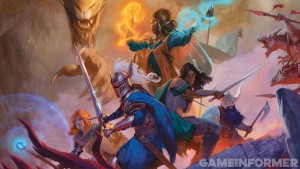Please support Game Informer. Print magazine subscriptions are less than $2 per issue
Opinion: There Should Be More Video Game Remixes

Mafia III should have been one of the best games of 2016. It wasn’t. Hanger 13’s debut title is a grindy experience peppered with brilliant narrative moments that hit hard. I loved Lincoln Clay’s story, watching him accept damnation as a cost for righteous revenge, and nearly every piece of dialog was sublime. I loathed that I had to play countless hours of subpar run-and-gun gameplay to experience that great story.
A couple of weeks ago, I checked out the two story expansions for Mafia III as well as a host of enhancements introduced across various updates to see if they made for a better experience. They did, but they didn't fix the base game’s fundamental length and repetition problem. While revisiting New Bordeaux, I couldn’t help but think about how much I yearned for a version of Mafia III that did away with all the grinding, that cut down the aimless and half-baked open-world exploration to focus on what was clearly the selling point: Lincoln’s story. As is, Mafia III feels like a linear, narrative-driven experience that’s chained to an open world – much to its detriment.
GamesRadar writer David Roberts recently penned a piece about coming to terms with Final Fantasy XV becoming a live service with constant changes that add content and give players a reason to keep exploring as well as editing existing sections that players criticized upon release:
When you boot up Final Fantasy 15, you're not just getting a single-player story; you're competing against everyone else in the world who's pursuing these timed quests. But unlike games like Destiny or larger MMOs like Final Fantasy 14, where these events are a core part of the experience, Final Fantasy 15's timed quests exist in the periphery. They're there for you to dig into if you want, or to ignore if you don't. Even January's limited-time Chocobo Festival, with its mini-games and exclusive dishes (which will unlock for use in the main game once you eat them) existed in a separate option on the title screen, acting as a special bonus for fans but completely invisible if you don't want to engage with that stuff. And if you missed it, well, you didn't miss out on anything that would fundamentally change your perception of Final Fantasy 15's story, and the special festival costumes are just free DLC that you can wear whenever you want anyway. Takahashi wants to host similar carnivals in the future, too, so you might have another shot to check out the next one.
As his piece sat with me, I started thinking more about games that could use remixes and titles that had received them and benefited from them. You could argue, for example, that CD Projekt Red, a developer beloved for its dedication to giving fans free content and honing games it’s already released, came into its own when The Witcher Enhanced Edition was released way back in 2008. The original version of the game was a great, if crude, RPG that served as a promise of everything that was to come in both The Witcher II and III. However, it was rough in a lot of places and clearly one of those games where its ambitions outweighed the technical and budgetary capacity of CD Projekt Red at the time. The Enhanced Edition did a great job of mending those issues, fixing glitches, adding animations and quests, and cutting down load times. The end result was that a solid, rough game was made great.

Of course, the one thing these two remixes have in common is pretty clear: They add new things to do in both games. I would like to see video game remixes and updates be bolder: adding and removing content to whatever best fits the experience. This is why Mafia III, a game loaded down with way too much repetitive activities, comes to mind as a game that could use a thorough trimming.
We live in an era of content now for video games and not necessarily one of refinement, and it hurts the medium artistically. We should not think of games as Costco bang-for-your-buck deals, but instead as singular experiences, and encourage an environment that rewards developers and publishers for creating games that embrace that mindset. While it makes senses for games like Destiny, World of Warcraft, and other service-y titles to constantly add content for players to be immersed in an ever-changing world, that same principle shouldn’t apply to the likes of Mafia III or Assassin’s Creed or any other narrative-driven singular experience just for the sake of having more things to do. Why clutter interactive worlds with frustrating chores when time and resources could be spent on creating more meaningful experiences on a smaller scale: one great mission instead of four fetch quests.
But that’s not the reality we live in. People want content. They want a certain amount of hours of enjoyment for every dollar they spend on a video game. Take a look at what was tearing up the charts in March, a month that saw the release of Mass Effect: Andromeda, The Switch, and Zelda. Neither Zelda or Mass Effect were number one: it was Ghost Recon Wildlands, a game with a ridiculous amount of (somewhat repetitive but fun!) content that you can play with friends. Wildlands is the sort of game that you can buy and play through slowly, with your pals, cooperatively over a period of months. It’s not hard to see why people love it and why they’re willing to shell out money for it over other games.

Remixes then can exist as a sort of middle ground, which is why I find the prospect of them exciting. Why not use the live-service model more courageously and take out missions that don’t work in a single-player open-world game? Or release an edited version of a story-driven game that’s got the fat cut out of it? I’d pay money for a tighter, better version of Mafia III that completely rehauled it and embodied the game's best characteristics. So fast. I know other people would too. If gamers are willing to shell out money for the bare-minimum effort remasters of yesteryear's titles, then I'm pretty confident they'd also put that money toward drastically improved games that offer the best experience.
Online and digital tech has changed the way we buy, store, and play games. The emergence of digital marketplaces like Steam and the PlayStation/Xbox storefronts allowed the indie boom of the mid-aughts. And now the ease with which developers can update and edit their games is unmatched and is changing how games live on after initial release, transforming sometimes into different beasts entirely. I’m curious to see how the medium evolves in the years to come because the combination of the technology at hand and developers’ creative visions, but I also hope that part of what plays out is something beyond content drops: a distillation of games into the best versions of themselves.










